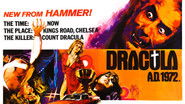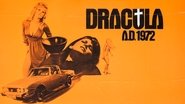SnoReptilePlenty
Memorable, crazy movie
ReaderKenka
Let's be realistic.
Beanbioca
As Good As It Gets
Mathilde the Guild
Although I seem to have had higher expectations than I thought, the movie is super entertaining.
JLRVancouver
Despite the presence of Hammer's iconic Gothic duo of Peter Cushing and Christopher Lee, "Dracula AD 1972" is a pretty mundane entry into the Dracula canon. Briefly, a group of counter-culture types get tricked into an unholy attempt to resurrect the blood-sucking count by "Johnny Alucard" (Christopher Neame) with predictable results. One of participants at the dark ceremony is the granddaughter of Professor Lorrimer Van Helsing (Cushing), who is in turn the grandson of Lawrence Van Helsing, who had dispatched the vampire exactly 100 years earlier and a vengeful Dracula (Lee) is out for blood, figuratively and literally. Cushing and Lee are fine playing their standard tropes but the youths are an uninteresting bunch and I doubt if anyone will much care if they live or die or undie. The worst part of the film is the soundtrack. I can accept that, when the music is actually embedded in the story (such as in the bar), then the music needs to match the scene but most of the score is simply background and setting Dracula and van Helsing's climatic showdown to cheesy '70's cop-show music quickly kills any sense of drama or horror. There are a number of ridiculous scenes such as Van Helsing working out the mystical significance of 'Aulcard's name as though he was deciphering the Rosetta stone, gory scenes with blood that sometimes looks like catsup, other times like vermillion poster paint, and above all Christopher Neame's hammy summoning of the Prince of Evil (admittedly a good 'who's who' of evil). Presumably, the film was an attempt of Hammer to ingratiate itself into a new generation of viewers and the film opens with the groovy, free-loving, hippie-types crashing a party hosted by a bunch of snooty 'upper class' types who are mocked for their 'squareness' until the 'fuzz' show up (a scene that serves no real purpose other than establish the 'hipness' of the film). The scenes featuring Cushing and Lee are too brief and the rest of the movie is not really worth watching, so this one's a miss for all but core vampire fans.
classicsoncall
Without the opening half hour or so, this is almost an okay Hammer flick. But oh my, what's with Stoneground and their hip rendition of 'Alligator Man'? That party scene was just ludicrous, as described by one of the blonde party goers who stated "It's all rather a bore".But then things got moving with the black mass satanic rites that brought forth Count Dracula from his century old dirt nap. The blood and ashes bit was pretty interesting, as well as all the new vampire lore introduced in the story, like the silver blade business and running water as a vampire killing strategy. And let's face it, Stephanie Beacham was absolutely stunning as the target of Christopher Lee's vampire revenge spanning the past hundred years.So with Johnny Alucard (Christopher Neame) demanding the power of immortality from the resurrected Master, I'm surprised Dracula didn't turn the faucet on him himself. This 'Bacchanal with Beelzebub' ended on a high note though; after getting the holy water treatment from Van Helsing (Peter Cushing), the screen writers opted for a neat switcheroo - instead of a stake through the heart, Dracula had his heart put through a stake. I think Jessica van Helsing (Beacham) had it right when she mentioned early in the picture - "The operative word is 'yuck'."
TheLittleSongbird
The Hammer Dracula series was mostly solid and entertaining, but the last three films were disappointing and three of Hammer's lesser efforts. Dracula A.D. 1972 has often been considered the worst of the Hammer Dracula films, for me it is one of the weakest along with Satanic Rites but by no means unwatchable.Starting with what's good, the best assets are Peter Cushing and Christopher Lee. Cushing brings real dignity and class here to a character that ranks with his best, his dialogue is often absolutely terrible but he remarkably delivers it with much conviction and seriousness(without being overly so). Lee has very little screen time and even little dialogue but is a towering presence and the embodiment of evil. The cast generally actually are decent, with the most memorable being Christopher Neame, he overacts at times and does seem to be trying too hard at times to channel Malcolm McDowell in A Clockwork Orange but he is incredibly charismatic, very sinister and is so much fun to watch. There are three good scenes, the genuinely exciting opening coach fight which features one of Dracula's most memorable demises of the series, Dracula's resurrection which is one of the series' most imaginative and the tense and entertaining ending which is one of the series' better and more plausible ones. The photography is incredibly stylish and the lighting has a lot of vibrancy and atmosphere.However, Dracula A.D. 1972's biggest problem is that it is very dated(especially in the production values, script and music), a term I try to avoid using but I do feel that it applies here. And this is not just by today's standards, it was dated back in 1972 as well. The sets are really lacking in atmosphere and are quite tacky and gaudy in colour, a cheaper version of Austin Powers. The very 1970s costumes and hair-styles are pretty much the same. The script is howlingly bad, Cushing has the worst of the dialogue(some of which are endless explanations) but the howlers come from Alucard, and while it provides some unintentional entertainment at first it gets very tiresome soon after. The film even tries to incorporate some Dracula mythos, but does absolutely nothing with it, a decent idea wasted. The soundtrack dates the film terribly, not only does it sound incredibly cheesy but it is always incongruous with what is going on, with tense scenes almost completely ruined by inappropriately 'groovy' music.The story has its moments, but does drag badly and was in serious need of more suspense, mystery, excitement and tension. It is especially bad in the party scene, which goes on forever and serves no point to the story at all, instead showing off an exhausting display 1970s fashions and behaviour at its worst, complete with the most unconvincingly played hippies for any film. The direction is often far too languid, the characters are not really all that interesting or engaging(with the most important characters being severely under-utilised, Dracula and Van Helsing's rivalry is so much more interesting than everything else in this film, why not show more of it?) and while most of the acting from the main players is decent, Caroline Munro is mesmerising to watch but is wasted by being killed off too soon, Stephanie Beacham is sexy but quite vapid and the acting for the hippies is mostly terrible.All in all, not unwatchable but one of the weakest of the Hammer Dracula series and lesser Hammer overall. 5/10 Bethany Cox
Roman James Hoffman
In the late 1950s Hammer Films revolutionised horror with the likes of 'The Curse of Frankenstein' (1957) and 'Dracula' (1958) which, for the time, pushed boundaries in terms of gore (not least through the knowledgeable use of colour film) and eroticism. They were commercial and critical successes that resurrected a dead genre (pun intended) and opened the door for a boom in horror movies equivalent to that in the 1930s.However, cut to the beginning of the 1970s and society itself had gone from Black and White to Technicolour due to the flowering of the counter-culture which saw all social institutions subject to intense criticism or outright attack and in horror we had seen the all-out assault of George A. Romero's 'Night of the Living Dead' (1968). As a result, recognising that quaint Vampire movies from England just don't get the scares they used to, Hammer tried to change things up. One thing they tried was ditching the subtle but potent eroticism for simply showing more tits and having the women engage in lesbianism. Another, more respectable, thing was to attempt to update the vampire story to make it more relevant to a modern audience. And from this comes 'Dracula AD 1972'.The plot is basically the same as any other of the Dracula sequels that came in the wake of 'Dracula' (1958): the count, dead since his last encounter with Van Helsing is brought back by a dutiful underling and seeks revenge. The film begins with an impressive period piece prologue showing Dracula's staking a hundred years ago and then, panning up, a plane screeches across the sky announcing the updated setting. The film then cuts to an amusing scene where a group of young hip cats (led by the charismatic and aloof Johnny Alucard) have gate-crashed a party and are "terrorising" the owners in the most limp and middle-class way. Later on they talk of where the next far out thrill will come from when Johnny suggests a black mass. They all attend for kicks but get freaked out when Johnny seems to take it too seriously and wants Jessica (family name Van Helsing) played by Stephanie Beacham, to get involved. She declines but the Prince of Darkness is summoned with the aid of another girl and, awakened to the twentieth century, Dracula is out for revenge.The film has been criticised by many as a failed attempt to desperately breathe life into the franchise, and while that charge can't be escaped, the conceit of the film to update Dracula is not a bad one. If anything, the failing of the film is that it didn't go far enough in its updating and still feels like the reserved period pieces which came before just in funky threads and platforms. What's more, director Alan Gibson (who would direct the next attempt to update Dracula with the much worse 'The Satanic Rites of Dracula') is no Terence Fisher and lacks the directorial subtleties which distinguish the earlier features. Still, Peter Cushing and Christopher Lee are sheer class, as always, and raise the film up a notch or two.All told, it's a decent attempt, with some good moments, and manages to be fun ride. However, considering that 'The Exorcist' was around the corner, it's no surprise poor old Dracula couldn't cut it. Which is sad.





